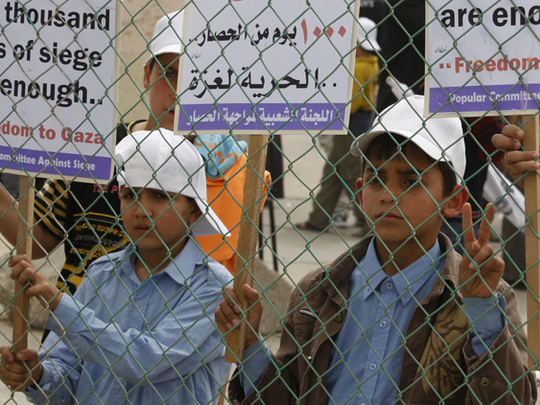
Doha: It was no surprise to the audience at the Doha Debates that took place last night, that 89 per cent of the people who took the vote at the event expressed their lack of belief in the Palestinian leadership.
The event that focused on the political differences between Hamas and Fatah, gave each of the panelists room to express his point of view, whilst taking questions from the audience.
Speaking for the Palestinian government and representing Fatah were Nabil Shaath, PLO's (Palestinian Liberation Organisation) chief negotiator who has served as the Palestinian Authority's first foreign minister for two years and Dr Abdullah Abdullah, Chairman of the political committee of the Palestinian Legislative Council and a senior Fatah spokesperson.
Representing Hamas, were Osama Hamdan, the Hamas representative in Lebanon and a member of the organisation's Political Bureau and Mohammad Nazal, a senior Hamas leader in Damascus and spokesperson for the Political Bureau.
The debate was opened and directed by the host (Debates' Chairman) Tim Sebastian from BBC, who asked key questions on the latest Palestinian issues.
The Egyptian document
First to speak Shaath, described the urgency and the importance of signing the Egyptian paper which is an agreement between Hamas and Fatah drafted by Egypt.
Fatah has signed the paper; however Hamas did not because they had some reservations.
"We need to sign the paper now before the Arab League Summit in Tripoli. A united Palestine is required, for the Arabs to help us implement this agreement," Shaath said.
From his side Nazal of Hamas blamed the American-Israeli interference for failing the negotiations between both parties. "We are trying to find a solution and to reach an agreement especially with out brothers in Fatah, but we have failed because of the American-Israeli pressures.
"We need to sit down and have a meaningful dialogue in order to find a permanent solution for national unity," Nazal said.
Hamas representatives denied all claims that Iran was behind the failure of the Egyptian-backed agreement, saying that one can not ignore the external factors, the Israeli-American along with the Egyptian's pressures.
"Despite our sincere efforts to make this agreement work, it did not. This is not a peace deal it is a piece of paper drafted by the Egyptians, and is know by the Egyptian paper, and we did not sign it because the final draft was changed due to the American-Israeli pressure that was imposed on them," Hamdan said.
"The Palestinians are suffering from the Israeli occupation, which is the main problem, and Israel is our main and sole enemy, and no one is highlighting this," he added.
From his side Dr Abdullah explained that Hamas' recent political announcements point to a new way to achieve unity between the two parties, which will assist them in resisting the occupation.
"We tell Hamas to sign the agreement… the cause is ours, the land is ours… you can not do it alone and we can not do it alone, so let us do it together," he said.
Addressing the issue of Hamas prisoners in Fatah's jail and vice versa, Hamdan explained that none of the prisoners were jailed for their political opinions but for committing crimes.
"We can form a joint committee from Fatah and Hamas, along with members from the Human rights organisation and Egypt to check the situation, we refuse to put people in jail for their political views and opinions. The committee can investigate that and if they found any prisoner jailed for his political view we will release him, and those who are jailed for committing crimes will be send to court," Hamdan said, arguing that the number of Fatah prisoners in Hamas' jails are far less from what the media is claiming.
The audience who has agreed on many things unlike the panelists, (the thing that was clearly shown in the vote), asked the leaders either to step down and bring a new generation to lead or to really work on trusting each other, in order to help themselves work on liberating their country.












